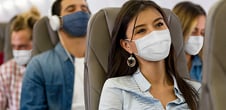Most bags travel and arrive with owners as planned. Actually things have improved a lot since ten years: baggage mishandling was reduced from 18.88 bags per 1000 passengers to 5.57 between 2007 and 2017!
Baggage rules are set by airlines and IATA plays no role in this activity. These rules can vary according to your frequent flyer status, the product you have purchased and the route upon which you fly, so please always check the rules that will apply to your trip with the airline directly.
Frequently Asked Questions
Where should I put my laptop, phone and other electronic devices?
We recommend that you keep all your Portable Electronic Devices such as laptops, tablets and mobile phones with you in your carry-on baggage. If you are traveling with spare batteries, electronic cigarettes/vapes or back-up power supply (power banks), these must always be carried in carry-on baggage and not checked baggage. Any spare batteries must be individually wrapped to prevent short circuit. More information about traveling with portable electronic devices.
What liquids, aerosols and gels am I allowed to bring on board?
More governments are adopting the guidelines from the International Civil Aviation Organization, the UN's aviation standard-setting body.
The current restrictions for liquids, aerosols and gels are that they must be in containers 100ml or equivalent, placed in a transparent resealable plastic bag with max capacity of 1-litre. In principle, restrictions do not apply to medications, baby foods, special dietary requirements, but consult your local airport to be sure.
What do I do when my bag goes missing?
First, you report it to the baggage claims department on arrival at your final destination. There you will provide information to the airline to help them track down your baggage. Most airlines use one of the major global baggage tracing systems. All missing baggage information is filed on this system and matched to bags recorded at airports around the world. Once a match is found, the baggage is returned to its owner. The vast majority of mishandled luggage is returned to the passenger within 48 hours.
Can I get a compensation if my bag is lost, delayed or damaged?
To claim a compensation, you should report your lost, delayed or damaged bag immediately at your arrival, to the baggage claims department and write to the airline within seven days after your declaration.
You will find more information about compensation in the Passenger Rights FAQs.
How do I make sure my bag is packed correctly?
Rules for luggage weight and size can vary depending on the airline, cabin class, and even aircraft size. See our recommendations on passenger baggage rules as to what needs to be packed where - cabin luggage or checked luggage, but do check with your airline for specific instructions.
Can I travel with a smart bag?
Smart luggage is luggage that contains a battery used to power itself or to recharge other devices. Batteries in luggage can cause problems for airlines when they are lithium metal or lithium ion batteries. If you can remove the battery from the smart bag and put it in your cabin luggage, you can check your smart bag. If the battery cannot be removed, the only option could be for the bag to be store in the cabin. But it depends on how busy the flight is, and is a decision to be taken by the airline. So be careful, if there is no space in the cabin, the bag could be left behind.
DID YOU KNOW?
Annually, more than 4 billion bags are carried by airlines globally – 99.57% of these arrive with their owners on time. But we are determined to do even better. Bags will be tracked at four points in the baggage journey. This means that in the rare cases when a bag does not arrive when and where it should, there will be much more information available to facilitate a quicker reunion.
Listen to this 4 minutes podcast for great tips on what you can do to limit risks for your baggage to not arrive at final destination at the same time as you.
Discover what happens to your baggage after you check-in in this video from Global News.







